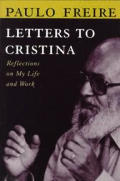
by Paolo Freire
Information and knowledge: a Review of Letters to Cristina
By Emily Inlow, MLIS Day
"Information is communicative, or generates communication, when receivers learn the content of what was communicated in such a way as to transcend the act of receiving. They do this by recreating the received communication and transforming it into knowledge concerning what was communicated. The receiver becomes the subject of the process of communication, which, in turn, leads to education as well … The goal should be toward information that is educational, which leads to critical knowledge, which implies the technical domain as well as political reflection, which ask the following: for whom, for what, against whom, and against what will these technical instruments work." - Paolo Friere
Most famous for his book Pedagogy of the Oppressed, Paolo Freire was a pioneer in education during the volatile 1960s and 1970s in Latin America. He came up with a popular education theory where oppressed people identify their own problems and come up with solutions to resolve them. Exiled from his native Brazil during a military coup, Freire continued his education work in other countries, including Ghana and Chile. Casa Latina a Seattle organization that provides ESL and other services, base their teaching model on his theories.
Letters to Cristina is a wonderful way to either introduce you to Friere's work or provide the biographical context for his ideas. It is a collection of letters that he wrote to his niece Cristina, in response to her questions about his life and theories. The structure of the book is an example of how he teaches. He brings real world examples from his own life and the lives he has encountered to explain in an intimate way his theories to someone who is unfamiliar with them. He talks about learning to read by learning to draw with a stick in the dirt of his mango-tree filled back yard. He talks about spending all of his money on books and journals, and not having enough left over for clothes. He describes the frustrations and challenges of working for social service agencies, of working for political change, and in the end of working in exile.
I wanted to share this book with the library community because I think it is a valuable resource for anyone who wants to teach any type of literacy, including information literacy. His theories are especially powerful in that regard, because without a contextual basis for technology, people will not see the use of it, and are less likely to learn it. In teaching technological literacy, people must be able to contextualize it in their own lives, or in other words understand it through their own experiences. The joy of reading these letters is that not only do you get to learn his theory, but you get to see it in practice, because for him, the writing of these letters is a pedagogical activity to increase the learning of his niece and all those who would read it. It is the closest any of us will ever come to seeing him work in a classroom. Friere writes,
"Education either functions as an instrument which is used to facilitate integration of the younger generation into the logic of the present system and bring about conformity or it becomes the practice of freedom, the means by which men and women deal critically and creatively with reality and discover how to participate in the transformation of their world."
I am writing this review on Easter day, and I believe there is no better way to honor it. Freire, like many of his ideological contemporaries in Latin America, was influenced by the tradition of liberation theology. His theories were a secular companion, and were often grouped with other theorists in the liberation psychology tradition.
Freire, Paulo. 1996. Letters to Cristina: Reflections on My Life and Work. Translated from Portuguese by Donaldo Macedo, [et al.]. New York: Routledge.
